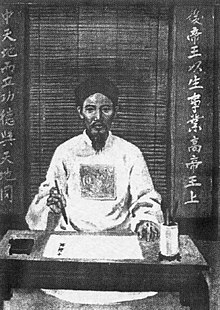Vietnamese philosophy

Vietnamese philosophy includes both traditional Confucian philosophy, Vietnamese local religious traditions, Buddhist philosophy and later introducing French, Marxist and other influences.
Confucianism in Vietnam
[edit]
Confucianism entered Vietnam and was later reinforced in the four Bắc thuộc periods of Chinese domination, beginning with the first Chinese domination of Vietnam from 111 BCE.[1] This was also the beginning of Taoism in Vietnam and Buddhism in Vietnam. Confucianism was reinforced in government by the Confucian court examination system in Vietnam, as well as the way family raised and taught children toward filial piety, through absolute obedience.[2]
Due to the influence of Confucianism, the feudal state of Vietnam placed early and significant emphasis on expanding education, with a focus on nurturing talented individuals and compiling historical records. As a result, the people became studious, respected teachers, and valued their culture. These factors collectively contributed to Vietnam being a country with a civilization predating many others in the region.[3] Confucianism also played a role in fortifying social order and fostering neighborly relationships.[4] In times of hardship, many individuals valiantly fought and made sacrifices for righteousness, driven by a moral spirit of humanity and a patriotic tradition. This ethos has contributed to a less brutal societal demeanor.
However, Confucianism has also been utilized as a tool by authoritarian regimes to uphold the status quo, often transforming loyalty into an impediment to challenging oppressive forces. This has led to the suppression of dissent and the subjugation of those at the lower rungs of society. While Confucianism promoted cultural and intellectual pursuits, it predominantly emphasized literature and history, often at the expense of science and technology. The pursuit of knowledge was often driven by a desire for scholarly recognition, leading to a focus on fame and position rather than freedom, independence, and self-reliance. Living in harmony and stability has its allure, but it often requires compliance, tolerance, deference to authority, and a reluctance to engage in reform and progress.[5]
Confucianism undoubtedly helped maintain societal order and morality, yet it has also acted as a barrier to democratization, innovative thinking, and societal development.
Nationalism in Vietnam
[edit]Communism in Vietnam
[edit]Socialism in Vietnam
[edit]Ho Chi Minh Thought
[edit]Study of Vietnamese philosophy
[edit]Most research on Vietnamese philosophy is conducted by modern Vietnamese scholars.[6] The traditional Vietnamese philosophy has been described by one biographer of Ho Chi Minh (Brocheux, 2007) as a "perennial Sino-Vietnamese philosophy" blending different strands of Confucianism with Buddhism and Taoism.[7] Some researchers have found the empirical evidence of this "blending" and defined the socio-cultural phenomenon as "cultural additivity".[8] Another, Catholic, writer (Vu, 1966)[9] has analysed Vietnamese philosophy as constituted of tam tài ("three body" Heaven, Man, Earth) philosophy, yin-yang metaphysics, and agricultural philosophy.[10] Tran Van Doan, professor of philosophy at National Taiwan University (1996)[11] considers that Vietnamese philosophy is humanistic but not anthropocentric.[12]
Notable philosophers
[edit]The confucian poet-philosopher-scholar is typified by Lê Quý Đôn. Other confucianists include Chu Văn An (1292–1370) mandarin, Lê Quát a 14th Century anti-Buddhist Confucian writer, Mạc Đĩnh Chi (1280–1350), Nguyễn Trãi (1380–1442) a famous Đại Việt Confucian scholar, Nguyễn Khuyến (1835–1909). Notable modern Vietnamese philosophers include Cao Xuân Huy (vi, 1900–1983), Nguyễn Duy Quý (vi, born 1932), Nguyễn Đức Bình (vi, born 1927), Nguyễn Đăng Thục (vi, 1909–1999), Phạm Công Thiện (vi, 1941–2011), Trần Văn Giàu (vi, 1911–2010), modern marxist philosopher Trần Đức Thảo (noted in Paris in the 1960s) and Vietnamese Catholic philosopher Lương Kim Định.
References
[edit]- ^ John R. Jones Guide to Vietnam 1994 - Page 29 "Confucianism. Confucianism entered Vietnam from China during the Bac Thuoc era (111 BC - AD 938) when the country was under the yoke.."
- ^ Napier, Nancy K.; Vuong, Quan Hoang. What we see, why we worry, why we hope: Vietnam going forward. Boise, ID: Boise State University CCI Press, October 2013. ISBN 978-0985530587.
- ^ "Bảo tàng Lịch sử Quốc gia". Bảo tàng Lịch sử Quốc gia. Retrieved 2024-05-19.
- ^ Thuân, Đinh Khắc (2004). "Sự thâm nhập của Nho giáo vào làng xã Việt Nam qua tư liệu hương ước". Tạp chí Nghiên cứu Tôn Giáo (in Vietnamese). 30 (6): 17–17. ISSN 1859-0403.
- ^ "Các chuẩn mực đạo đức cơ bản của Nho giáo với việc rèn luyện đạo đức cán bộ, công chức ở Việt Nam hiện nay". hutoglobal (in Vietnamese). Retrieved 2024-05-19.
- ^ Teaching and research in philosophy: Asia and the Pacific Unesco - 1986 Page 363 "On matters relating to national traditions in philosophy, the Vietnamese philosophers will continue to study the history of national philosophy, to write books on the history of Vietnamese philosophy, to do research on the typical characteristics ..."
- ^ Pierre Brocheux, Ho Chi Minh: A Biography 2007 - Pages 204,205 “Ho was also steeped in the perennial Sino-Vietnamese philosophy that blended Confucianism (in its plural form incorporating Confucius, Mencius, Xunzi, and Wang Yang Ming)7 with Buddhism and Taoism."
- ^ Vuong, Quan-Hoang (2018). "Cultural additivity: behavioural insights from the interaction of Confucianism, Buddhism and Taoism in folktales". Palgrave Communications. 4 (1): 143. doi:10.1057/s41599-018-0189-2. S2CID 54444540.
- ^ Vu Dinh Trac, "Triet ly truyen thong Viet Nam don duong cho Than Hoc Viet Nam," Dinh Huong 11 (1966)
- ^ Peter C. Phan Vietnamese-American Catholics 2005 Page 27 "Vu Dinh Trac believes that traditional Vietnamese philosophy is constituted by tam tai philosophy, yin-yang metaphysics, and agricultural philosophy. These three strands are illustrated by the various symbols on the upper surface of the Dong ..."
- ^ "Tu Viet triet toi Viet than," Dinh Huong 11 (1996)
- ^ Fumitaka Matsuoka, Eleazar S. Fernandez, Realizing the America of Our Hearts: Theological Voices of Asian Americans, St. Louis, Mo: Chalice Press 2003, ISBN 0827232519, page 178: "Another important contributor to the retrieval and elaboration of Vietnamese philosophy is Tran Van Doan, professor of ... For Tran Van Doan, Vietnamese philosophy is humanistic (vi nhan) but not anthropocentric (day nhan) in so far as ...
